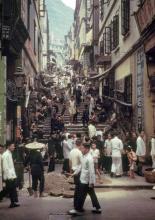70 years ago: Hong Kong's wartime diaries
27 Sep 1942, Barbara Anslow's diary
Submitted by Barbara Anslow on Mon, 2012-02-27 12:57Book / Document:Date(s) of events described:Sun, 27 Sep 1942Wonderful rumour - that BBC (not BCC which is British Communal Council) announced that all British civilian internees are to be repatriated soon - but the rumour isn't yet very strong. Trouble over notices on Board, not seen by Superintendents. We are still very much in disgrace over the 'V's' at concert.
Mum gave Mabel her 'seconds' in pasties - so pleased she had the chance to give her something. ((Seconds were 'second helpings' which were served at the end of a meal if there was any left over after the regulation rations hd been served; strict lists were kept of seconds, every person had their turn of seconds in rotation. Pasties were the best meals in camp, even if the contents weren't always meat: the pastry casing was heaven.))
Finished writing Chapter 7.
27 Sep 1942, R. E. Jones Wartime diary
Submitted by Admin on Thu, 2012-08-30 22:24Book / Document:Date(s) of events described:Sun, 27 Sep 1942Fighting at Shum Chun. ((Today called Shenzhen)) Jap women & children leaving.
Hitler has visited Stalingrad front & has returned to Berlin for conference re possibility of carrying on Stalingrad attack?
Jap troop movement to & from Fort.
Repatriation request details being worked out.
27 Sep 1942, Chronology of Events Related to Stanley Civilian Internment Camp
Submitted by brian edgar on Thu, 2014-03-27 01:55Book / Document:Date(s) of events described:Sun, 27 Sep 1942The Lisbon Maru has been waiting for 778 Japanese soldiers who are to be carried back to Japan. They're on board and at 8 a.m. the ship finally leaves Hong Kong.
The POWs are crammed into three filthy and unhygienic holds, but they're allowed on deck for an hour as the ship steams away.
Robert Wright, of the Middlesex Regiment, recalls:
It was a hot, sunny afternoon, and I found myself beside a Mr Gorston ((probably Thomas Gorman - Tony Banham's note)), who had served with the Hong Kong Police. Neither of us spoke at first, and as we sailed past Stanley Point, where we had made our last stand, I saw tears streaming down the man's cheek.
Source:
Tony Banham, The Sinking of the Lisbon Maru, 2010, Kindle Location 986-998
27 Sep 1942, Eric MacNider's wartime diary
Submitted by Old Man on Tue, 2014-07-08 22:55Book / Document:Date(s) of events described:Sun, 27 Sep 194227 Sep 1942, John Charter's wartime journal
Submitted by HK Bill on Sun, 2021-04-18 10:14Book / Document:Date(s) of events described:Sun, 27 Sep 1942The next alternative ((for what to do after the evening meal)) is to go and listen to a lecture or to Betty Drown and Heath giving their Monday night piano recital at St Stephen’s Hall. We have been to one lecture only (that was on the history of surgery by Dr I. Newton) but have been several times to listen to the music. These two are awfully good: they play on two pianos, either duets or solos, one carrying on from the other. They play a mixture of the lighter and more popular classical music followed, perhaps, by a pot pourie of modern musical comedy and popular songs, then some well known national airs or perhaps selections from well know operas. They play practically non-stop from 6:45 to 7:45 p.m. and they have a tremendous following. It is very good and popular entertainment.
Otherwise we take our books with us and sit on the rocks for an hour and talk or read. We generally go to Maudies on 3 nights per week. We have to be back within the vicinity of our blocks by 8:00 p.m. when a bell is rung. This curfew is extended on Saturday nights until 9:00 p.m. and on Saturday nights there is nearly always a concert on, which we always attend.
These concerts, for the last few months, have been given on the bowling green in front of blocks 4 A (formerly European Warders Club House) and D1. The stage is on the terrace in front of block D1 which, being about 2’ 6” above the bowling green, forms a natural little stage. A backcloth and wings of curtains are rigged up for the concerts and block D1 forms not a bad reflector for throwing forward the sound. The audience sits on cushions or rugs on the bowling green (low stools are permitted but not chairs because they obstruct the view of the people behind) or along the bank which runs right around the bowling green or on the balconies or roof of the adjacent Club House.
There are now roughly 2,800 people in camp and I should think that at least 2,000 of these turn out to watch the Saturday night concert - it is the social event of the week. And some of the concerts have produced some surprisingly good turns: dances; sketches or impersonations; songs (some of local composition) etc. But up to date, last Saturday’s concert has produced the best entertainment of all. (That is Saturday 19th).

